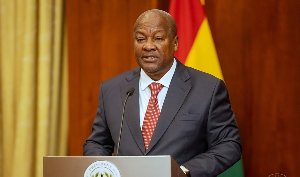Accra, Nov. 4, GNA - The Monetary Policy Committee of the Bank of Ghana (BoG) has reduced the Bank's Prime Rate from 26.0 per cent to 24.0 per cent taking into consideration the balance of risks.
The Committee in a 16-point summary said the decision was based on the fact that there was considerable improvement in the key macro-economic indicators during the third quarter of this year and that the process of disinflation was taking hold.
It said headline inflation had continued its downward trend. This was contained in the Monetary Policy Committee release accompanying the Review of the Economic Policy of the Government presented to Parliament by the Minister of Finance and Economic Planning, Mr Yaw Osafo-Maafo.
The Committee said the 12-month consumer price inflation eased from some 29.6 per cent in June to 27.7 per cent in August. The average monthly increases in the index have diminished steadily since the hike in February, this year, and have been the lowest since 1999.
The fiscal deficit along with the public sector borrowing requirement is now being reduced. Government finances continued to improve through September.
It said Government revenue was higher than projected and expenditure was kept within budgeted levels. Provisional data for the year through September 2003 indicated that total receipts for Government amounted to some 13,014 billion cedis, an increase of some 71.0 per cent above 2002 levels.
Meanwhile, total expenditure was 12,381.0 billion cedis - some 40.0 per cent above the level for 2002.
The Committee said road and non-road arrears "District Assemblies' Common Fund (DACF) and Ghana Education Trust Fund (GETFund)" were cleared at a somewhat faster pace, exceeding budgeted levels and no new arrears were accumulated in respect of the DACF, GETFund or Social Security and National Insurance Trust (SSNIT) contributions during the period.
The fiscal accounts registered a domestic primary surplus of 758.4 billion cedis, which represented 1.16 per cent of Gross Domestic Product (GDP) compared to a projected 0.96 per cent of GDP. The net domestic financing of the budget at the end of September 2003 was some minus 493.0 billion cedis (-0.75 per cent of GDP) compared with a budgeted deficit level of 122 billion cedis (0.10 per cent of GDP) for September 2003.
This indicates that public sector operations have begun to release resources to be channelled to the Private Sector.
The Committee said the growth of the monetary aggregates have continued to slow down. Year-on-year growth in reserve money declined from some 42.6 per cent in December 2002 to 32.4 per cent in September 2003. Similarly, broad money (M2+) growth declined from some 50.0 per cent in December 2002 to 39.0 per cent by July 2003.
It said the interest rates on the money markets have continued on a downward path. The benchmark 91-Day Treasury Bill Rate declined from some 34.0 per cent at the end of June to some 25.0 per cent at the end of September 2003 and the yield curve has turned positive.
Interbank money market rates also declined during the period from some 27.0 per cent in June 2003 to some 25.0 per cent at the end of September 2003, adding that the commercial bank lending rates have lagged, remaining broadly unchanged.
The Committee stated that the maturity structure of the stock of Government securities has shifted from the short towards the long end. The share of 91-day Treasury Bills declined from 53.0 per cent in June to 49.0 per cent by August while the shares of 182-day and one year Treasury Bills increased from 29.0 per cent and 5.0 per cent, respectively to 31.5 per cent and 6.5 per cent, respectively, by the end of August 2003.
Holdings of Government securities by the non-bank private sector have increased. Banking system holding of Government securities declined from 55.0 per cent in March 2002 to 43.5 per cent in August 2003.
It said the external sector developments have remained cyclically favourable serving to underpin an improving balance of payments. While cocoa prices have softened from the recent peak levels, total earnings from cocoa for the year to August was 578.5 million dollars, an increase of 74.1 per cent over the same period last year.
Export earnings from gold for the year to September 2003 amounted to 591.3 million, 18.4 per cent higher than the levels recorded in 2002. The Committee indicated that the higher levels of foreign exchange flows observed on the exchange market during the first half of the year has continued. Total purchases and sales of foreign exchange on the Interbank and forex bureau exchange markets for the year to September 2003 amounted to 1,017 million dollars.
This represents an increase of 45.0 per cent over the same period last year. Foreign inward remittances, covering transfers by non-governmental organisations (NGOs), religious groups, embassies, individuals, among other groups, through the deposit money banks and finance companies amounted to 1,379 million dollars by August 2003, a 56.0 per cent increase over the levels recorded over the same period in 2002.
The Committee said the cedi has also remained relatively stable on the foreign exchange market and volatility has been reduced despite the spill over effects of the euro/dollar exchange rate movements on the international foreign exchange market.
On the inter-bank market, the cedi has depreciated by 3.50 per cent against the dollar since the beginning of the year.
The Committee noted that surveys and broad indicators of economic activity showed some resiliency in output. These are reflected in trends of international trade flows; port activity, output of key industries, domestic VAT, private sector employment contributions to SSNIT, and industrial electricity consumption.
It however said credit to the private sector has remained flat in real terms.
It stated that the Ghana Stock Exchange continued its strong performance through to the third quarter, with the All-share index, the main gauge of the exchange, posting a return of 89.5 per cent at the end of September compared with 37.1 per cent during the same period last year.
The Committee said the economic outlook was favourable, with prospective seasonal increases in cocoa exports and given private sector remittances at current levels.
Gross international reserves have increased from 880 million dollars in July to 1,012 million dollars by the end of September 2003, the highest level in decades. This represents about 3.4 months of imports of goods and services, compared to the projected position of 2.3 months of reserve cushion for 2003.
The build up of international reserves has been driven by a combination of cyclically favourable terms of trade, savings from HIPC, and firm implementation of the fiscal-monetary framework.
It said as to the outlook for inflation, forward-looking surveys indicate that inflation expectations were shifting downwards.
Nevertheless, there continued to be downside risks inherent in world oil prices, and exchange rate realignments of the major international currencies.
The Committee said the economic outlook over the short and medium term would continue to be driven by sustained implementation of the fiscal and monetary framework and a continuation of structural reforms to bolster productivity and output growth.
Business News of Tuesday, 4 November 2003
Source: GNA












